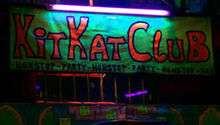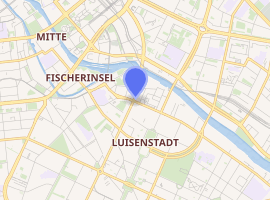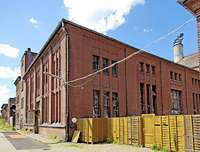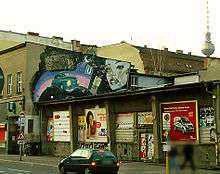KitKatClub
The KitKatClub is a nightclub in Berlin, opened in March 1994 by Austrian pornographic film maker Simon Thaur and his life partner Kirsten Krüger.
- For the 18th-century English club in London with strong political and literary associations see the Kit-Cat Club.
KitKat | |
 KitKatClub Berlin | |

| |
| Location | Mitte, Berlin, Germany |
|---|---|
| Coordinates | 52°30′40″N 13°25′00″E |
| Owner | Simon Thaur and Kirsten Krüger |
| Type | Nightclub |
| Opened | March 1994 |
Overview

The KitKatClub is said to attract patrons from all over Europe and other parts of the world because of its music selection (techno and trance music) and its sexually uninhibited parties. The motto of the club is "Do what you want but stay in communication".
Guests are allowed to engage in sexual intercourse openly at the venue. A strict dress code needs to be respected in order to get into the KitKatClub door, often enforced by Kirsten herself, and requiring fetish, latex, leather, kinky, high style, and glamour. The venue consists of three dance floors and an outdoor area with a pool. It is decorated with ultra-violet light and fluorescent color paintings done by the Berlin-based painter Vigor Calma aka "Der Träumer" (the dreamer) [1].
In recent years, the KitKatClub has tended to be less unruly. Enjoying music and dancing are now more important to the guests than coitus with their fellow patrons.[2]
The guests are not only heterosexual, a large number of homosexual people also spend their weekends in the club, allowing a high level of diversity amongst the clubbers.
Through the years the KitKatClub has become a notorious Berlin institution.

The club moved four times since its opening in 1994. It opened in Glogauer Straße in the Kreuzberg district in the former Turbine. In 1999 it moved to one of the biggest nightlife regions of Berlin, Neues Schauspielhaus at Nollendorfplatz. In 2001, it moved to another lot in the district Tempelhof (which became part of Schöneberg in the year 2000) in Bessemer Straße. At the beginning of July 2007 it moved to the SageClub in the Mitte district (Brückenstraße 1), very close to the techno club Tresor. It could be considered a noteworthy change in Berlin's clubbing landscape as Berghain, Tresor and KitKatClub now are located very close to each other.
When the KitKat opened its doors in 1994 the musical profile of the club was mainly classical trance mixed with goa trance, but through the years the owners have opened the club to a much larger choice of electronic music. Some guests refer to the musical style that has developed as the "KittySound". To give this style a platform, a KitKat record label was founded in 2005 and two CDs were released, Hedonistic Nightlife in Berlin and The Piep Show Compilation #0.
The KitKatClub Berlin celebrated its 20th anniversary on March 1, 2014. At that time a novel about the early years of KitKat was published under the same name „KitKatClub“ [3], written by Vigor Calma. In 2019, a new edition of the novel appeared under the title "Rausch in Berlin" (german language only)[4].
After the closing and the loss of any income due to the pandemic the KitKatClub set up a website to support the club and transmitting streams live from the location.
Name origin
The name KitKatClub is inspired by the frivolous Berliner nightclub featured in the American musical Cabaret. Harold Prince’s Cabaret was set in Berlin in the early 1930s, against the backdrop of the ascent of the Nazi party, at a burlesque theater called the "Kit Kat Club". The name originated from the Kit-Cat Club, an 18th-century English liberal political society.
See also
- List of electronic dance music venues
References
- Blacklight paintings by Vigor Calma
- "Berlin clubs - the ten most famous and notorious". 2017-02-03. Retrieved 2018-11-13.
- Interview with Vigor Calma (german language)
- Vigor Calma: Rausch in Berlin. Publisher.: Vigor Calma. 4. Auflage. 2019, ISBN 978-1-07-046997-3, S. 475.
External links
- (in English) KitKatClub's official website
- (in German)streaming-site
- (in English) KitKatClub DVD booklet (English/Deutsch – PDF) 1994–2005 – History of the KitKatClub by Kirsten.
- (in English) KitKatClub@Myspace
- (in German) KitKat-photo gallery – Opening @ sageclub July 2007
- (in English) Read KitKatClub's reviews on Berlin-Life.com
- (in German) „Die Bühne ist der Star“ – about the KitKatClub, by Henning Kober, die tageszeitung (taz), 28. Feb. 2004
- (in German) „Erlaubt ist, was gefällt“ – by Elmar Schütze, Berliner Zeitung vom 3. Mai 2001
- (in German) "Locker trotz SM" – S&M view about the KitKatClub
- (in German) KitKatClub @ Alter Wartesaal (Köln)